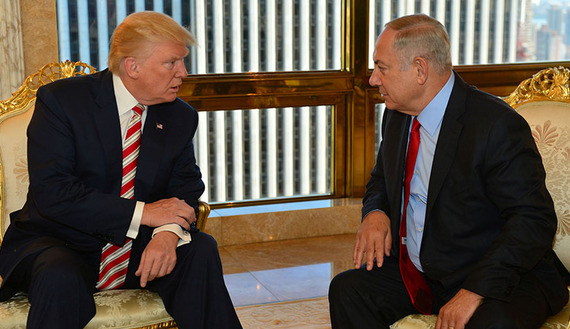
Donald Trump’s shock election as president will likely result in a US tilt towards Israel that puts a Palestinian state even further out of reach, his own campaign team and analysts say.
While so much about Trump’s thinking on the Middle East remains unknown, he and his advisers have spoken of overturning decades of precedent by recognising Jerusalem as Israel’s capital and relocating the US embassy from Tel Aviv.
Trump said in March that “there’s nobody more pro-Israel than I am,” adding that he would oppose any attempt to force Israel into an agreement it opposes.
The president-elect’s adviser on Israel, David Friedman, told AFP last month that he does not believe Trump sees Jewish settlements in the occupied West Bank as illegal, as nearly all the rest of the international community does.
Asked whether he believed in the two-state solution, the basis of more than two decades of peace negotiations, Friedman said Trump was “tremendously sceptical”.
“A Trump administration will never pressure Israel into a two-state solution or any other solution that is against the wishes of the Israeli people,” Friedman told a Trump rally in Jerusalem in October.
The Israeli right has welcomed such statements and seized on Trump’s victory to promote its cause — including, for some, a call to bury the two-state solution once and for all.
Hardline lawmakers, including some from Prime Minister Benjamin Netanyahu’s Likud party, said Trump’s win represented a “historic opportunity” to abandon ideas of Palestinian statehood and move towards annexing the West Bank.
Education Minister Naftali Bennett, who heads the religious nationalist Jewish Home party and is seen as having ambitions to be prime minister, said “the era of a Palestinian state is over.”
Netanyahu, whose government is considered the most right-wing in Israeli history, has so far been more cautious.
Analysts say that may be because he is wary of Trump’s notorious unpredictability.
As an example, they cite a statement by Trump earlier in the campaign in which, to the alarm of Israelis, he described himself as neutral in the Middle East conflict.
While Netanyahu and Hillary Clinton may have ideological differences, he at least knows where she stands and what to expect, they say.
Netanyahu congratulated Trump and pledged to work with him, and the two men spoke by telephone on Wednesday.
“The two leaders, who have known each other for many years, had a warm and heartfelt conversation,” a statement from Netanyahu’s office said.
“They also discussed regional issues. President-elect Trump invited Prime Minister Netanyahu to a meeting in the United States at the first opportunity.”
– ‘Loose cannon’ –
While Trump’s unpredictability is a concern for Israelis, Netanyahu may be relieved to have a Republican in the White House after facing mounting criticism from President Barack Obama over Israeli settlement building in the occupied Palestinian territories.
Israel is concerned Obama may seek a UN Security Council resolution on the issue before he leaves office on January 20.
“There are many signs that the Trump administration could be very accommodating when it comes to getting along with the current Israeli government,” said Shmuel Rosner, a senior fellow at the Jewish People Policy Institute.
“This will be the time for right-wing Israeli Prime Minister Benjamin Netanyahu to have a counterpart in Washington that is not instinctively against him and against his policies.”
The Palestinians, too, have publicly taken a cautious approach despite reasons for concern.
President Mahmud Abbas congratulated Trump and said he hoped peace could be achieved during his term based on the borders of 1967, the year Israel occupied the West Bank.
However, a high-ranking Palestinian official told AFP that “we are worried because we have here someone who has been completely unpredictable, a loose cannon, and also because this is not an issue just for the Palestinians but for the rest of the world.”
He said the one consolation was that “his statements are so unfeasible, unreasonable, illogical, so in violation of international laws and the international consensus, that they cannot be implemented.”
“When faced with the realities of the office, things change,” the official said, speaking on condition of anonymity.
For Israel, there is no more important ally than the United States, which grants it more than $3 billion a year in military aid.
While many of Trump’s statements so far have pleased the Israeli right, some analysts warn that nothing should be taken for granted.
“Trump smashed all possible rules and he will have no problem, if he wishes, smashing this one too,” columnist Ben Caspit wrote in Israeli newspaper Maariv.
Middle East Online

Leave a Reply
You must be logged in to post a comment.